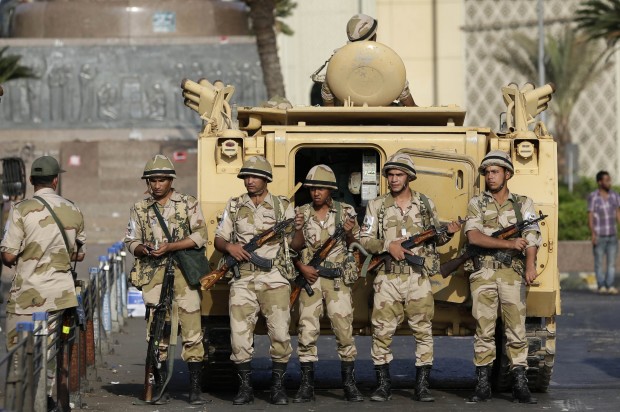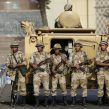
BRIEFS
Publication: Terrorism Monitor Volume: 11 Issue: 17
By:

JIHADIS CHALLENGE THE ROLE OF THE ARAB ARMIES
Andrew McGregor
With one Arab army locked in battle against rebels (including Sunni Islamists) in Syria and another apparently set on cleansing the Egyptian political scene of its Islamist presence, a prominent jihadist scholar has questioned the role of Arab militaries in the modern Middle East. In an article entitled “Is There Any Legitimacy Left for the Arab Armies?,” Shaykh Abu Abdulillah Ahmad al-Jijeli calls on Arabs to look closely at the fighting doctrines, methods, education and loyalties of their military elites rather than accept the claims of these militaries that they are guardians of the nation or defenders of the interests of the umma (Islamic community). Al-Jijeli suggests that the leaders of the Arab armies form a corrupt, Westernized elite that exists free of oversight or accountability.
Shaykh al-Jijeli identifies the following as the main problems with modern Arab militaries:
- Arab militaries have a common allegiance to the “secular trend” and are hostile to Islam.
- Blind obedience to military commanders comes before obeying the law of Allah. Orders must be executed without reference to the Koran or Sunna.
- The movement and freedom of Arab armies is inhibited by bilateral and multilateral alliances that tie these armies into a global military and security system.
- Rather than following the law, these armies live above it without accountability, making presidents and policies in accordance with their own corrupt principles and the interests of their supporters in Russia, Europe or America.
- Under the pretexts of counterterrorism and international legitimacy, the Arab armies allow themselves to be moved about according to the will of the Western “crusader armies.”
- The military leaderships ignore mandatory retirement ages in order to perpetuate themselves in power for as long as possible. The shaykh cites as an example Algerian army chief General Ahmed Gaïd Salah, who is “near the end of his ninth decade.”
The shaykh concludes that Arab Muslims have the right “by every standard” to question the legitimacy of these armies following their “horrible crimes.” According to al-Jijeli, the Algerian, Syrian and Egyptian peoples could have avoided their current misfortunes and the crimes of their corrupt militaries if they had owned arms individually, “the only guarantee to remain alive, in a world that only understands the sounds of bullets and only respects the heavy boots.”
Al-Jijeli’s critique was followed a few days later by a statement delivered by Abu Muhammad al-Adnani, a spokesman for the Islamic State of Iraq and Syria (ISIS), in which al-Adnani called on Salafists to join the battle against the Egyptian military.
In Sunni Islam, the military traditionally undertakes the functions of defense and jihad on behalf of the community, rendering it basically unassailable by the community it represents. Al-Adnani challenged this basic interpretation by identifying the Arab armies as the defenders of apostate and tyrannical rulers rather than the Islamic community:
The ISIS spokesman also criticized the Muslim Brotherhood (“a secular party disguised as Islamists”) and the Salafist al-Nur Party (which has decided to support the army’s takeover) for being too peaceful at a time when violence is called for (al-Tahrir TV [Cairo], September 1). [2] Al-Nur leader Younis Makhioun says the party has been forced to distance itself somewhat from the military’s “roadmap” for Egypt due to security abuses, but at the same time rejected jihadist calls to fight the military: “There are conspiracies to attack the Egyptian army… Those who carry them out are traitors” (Daily News Egypt, August 28).
As the Egyptian military tries to separate itself from the discredited Mubarak regime, a new decree that ends the practice of Egyptian troops pledging direct loyalty to the Egyptian president is designed to create distance between the military leadership and Egypt’s political leadership (Daily News Egypt, September 2).
Notes
1. Shaykh Abu Abdulillah Ahmad al-Jijeli, “Is There Any Legitimacy Left for the Arab Armies?” al-Andulus Media, August 26, 2013.
2. See https://www.youtube.com/watch?v=JLuiccsV8JE&feature=share.
NIGERIAN ARMY TAKES OVER ANTI-BOKO HARAM OPERATION
Andrew McGregor
Nigerian President Goodluck Jonathan has authorized the creation of a new Nigerian Army Division dedicated to conducting operations against the Boko Haram Islamist militant group in the Borno, Yobe and Adamawa states of north-eastern Nigeria currently under a state of emergency. The new Division is taking over operations against Boko Haram from the multi-service Joint Task Force (JTF), a counter-terrorism force initially created to combat militants in the oil-rich Niger Delta, but whose deployment in north-eastern Nigeria during the current anti-terrorist offensive has been characterized as heavy-handed with a casual regard for the safety and security of civilians in combat areas.
The handover from the JTF to the new division took place on August 19 and marked a new stage in Operation BONOYA, a three-month old offensive against Boko Haram terrorists operating in northeastern Nigeria near the unsecured borders with Chad, Niger and Cameroon. With its headquarters in Maiduguri, the new division will be under the command of Major General Obida Etnan, former commander of the Army Garrison Headquarters in Abuja (Nigerian Tribune, August 18).
Three armored brigades currently based in the northeastern states of Bauchi, Borno and Adamawa will form the core of the new division along with the 241st Reconnaissance Battalion in Yobe, which brings the Nigerian Army to a strength of six divisions with headquarters in Maiduguri, Kaduna, Jos, Bradan, Lagos and Enugu (Daily Trust [Abuja], August 19; Nigerian Tribune, August 18). Some 900 Nigerian troops that were prematurely withdrawn from their mission in Mali will also be directly assigned to the new division (Leadership [Abuja], August 19; for the Nigerian withdrawal from Mali, see Terrorism Monitor Brief, July 25).
Earlier this year, Chief of Army Staff Lieutenant General Onyeabo Azubuike Ihejirika created a new counterterrorism training center in Kontagora (Niger State) where Nigerian troops could receive advanced training for operations against Boko Haram. The director of the training facility, Brigadier General TK Golau, said the course included training in house entry and clearance, urban patrols, unarmed combat, arms skills, the creation of road-blocks and checkpoints, recognition and disposal of IEDs and “the dynamics of terrorism and insurgency as they relate to Boko Haram, among others” (Leadership [Abuja], February 21).
The creation of the new division came a day before General Ihejirika made a scathing speech before various commanding officers in which he criticized the army’s mode of operations against Boko Haram and complacency in the officer corps that was allowing infiltration of the military by terrorists (Channels TV, August 19). The remarks were a counterpoint to President Goodluck Jonathan’s more optimistic views: “We are consistently adapting our security architecture to deal with terrorism which has become a challenge to the whole world. Boko Haram is being progressively weakened but we are not resting on our oars. We will continue to do everything possible to achieve greater security for all who reside within our borders” (Guardian [Lagos], August 31).
However, despite his efforts to improve discipline in the Army’s ranks, General Ihejirika has come under accusations of nepotism and ethnic favoritism from other senior officers who have gathered under the banner of the Group for the Salvation of the Nigerian Army (Osun Defender/Punch [Lagos], September 4).
Meanwhile, attempts by the civilian population to assert themselves against Boko Haram terrorists through the formation of vigilante groups backfired on August 31 when roughly 100 members of a Borno vigilante group joined what they thought was a group of uniformed Nigerian troops on their way into the forest to apprehend Boko Haram members. The men instead led the vigilantes into an ambush in which 24 were killed (AFP, August 31; Reuters, August 31).
The vigilante groups are typically poorly armed (often bearing little more than machetes and clubs) but have played an important part in intercepting Boko Haram movements, making the vigilantes and their families a target for retribution. However, there are fears that the formation of vigilante groups from unemployed youth in the region will open the door to their use as private militias by various politicians (Nigerian Tribune, September 1).





